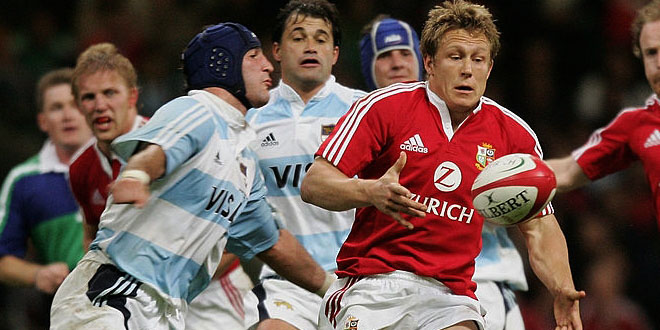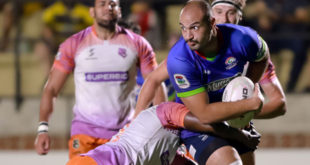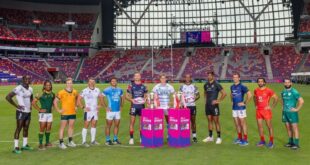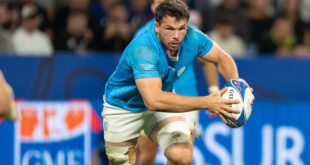Warren Gatland has been formally announced as the man to lead the British & Irish Lions to New Zealand next year. It was a surprise to no-one, and yet the minor media circus has nudged Lions fever ever so slightly into second gear. In recent weeks we’ve heard the opinions of the ‘stakeholders’ and various pundits on how the Lions are antiquated and the tour is ‘too long’ and starts ‘too early’ and how we must consider ‘player welfare’ to reduce an already bursting and bubbling fixtures calendar.
Of course if you actually ask any of the players, not a single one who has worn the jersey or so much as attended a week of training would say the same. To a man they invariably claim it as the pinnacle of their career, an honor and privilege beyond that of any club or international adventure. A World Cup winner might have an argument, but the point is the players want the full Lions experience. The fans most certainly do. A pessimistic outlook suggests that the tradition is on shaky ground. Let’s hope it is not.
Putting beside the argument of whose interests are more important, is there another way to potentially revamp and freshen up the Lions brand? It seems blindingly obvious that there is.
Rugby is on the rise across the globe, nowhere more insidiously than the great markets of North and South America. While the big four – NFL, NBA, MLB, and NHL – dominate the North American sporting landscape and soccer the South, record audiences are popping up at stadiums and on television, and the Olympics has now put the sport front and center. The exposure means that rugby is no longer an alien sport. Though its rules and intricacies remain shrouded to casual observers, there is now a significantly larger potential audience whose curiosity is reaching out to be captured by the best the sport has to offer.
The time is now for the Lions to return to the Americas. If the powers-that-be have any foresight they will eschew South Africa in four years time in favor of Argentina. The Pumas have beaten the Springboks twice in the past year and are now among the very best teams in the world. Such a trip would not be a first for the best of the British Isles. The last tour was in 1936 and after 80 long years the time is now to return.
THE PAST
Before Argentina was bumped off the regular tour schedule in the post-war era in 1950, they were a regular destination of the Lions. The first tour was in 1910, though there is some debate as to its status with a second tour to South Africa overlapped with the end of the trip. Officially the team was dubbed the ‘Combined British’ with players from England and Scotland included but none from Ireland or Wales. It marked the beginning of international rugby for Argentina. The British side won all six matches including the only ‘test’ in Buenos Aires.
In fact the first five tests for Argentina were all against the de facto Lions. It wasn’t until the second tour in 1927 that further test caps were awarded. The visiting ‘Great Britain XV’ won all nine matches convincingly, including all four against Argentina. By now the team had been referred to as the Lions, though not in an official capacity, and it was comprised of players from England, Scotland, and Ireland.
A full 10-game tour was undertaken in 1936, again missing only Welsh representation and again under the ‘Great Britain XV’ banner. Nine of the matches were played at the Gimnasia y Esgrima stadium in Buenos Aires. The only test saw Argentina fall 23-0, which would be the closest result of the tour.
The Lions have not returned to Argentina since, though they did play the Pumas in a one-off game in Cardiff before their 2005 tour to New Zealand. Had Jonny Wilkinson not landed a late penalty goal to save a 25-all draw it might have been a famous victory for Los Pumas.
Of course the Lions have been elsewhere in the Americas. Both the 1959 and 1966 tours ended in Canada, with two matches played on each occasion. Most memorable of those was a remarkable 8-3 victory by British Colombia over the Lions at Empire Stadium on September 14, 1966.
THE FUTURE
It seems inevitable that a Lions tour will return to Argentina at some point, particularly with their formal integration into SANZAAR. Agustín Pichot now stands beside Bill Beaumont at the head of World Rugby. The stars are aligning, as one might say. A strictly localized Argentine tour may not be the best choice, however, when one considers the impact a tour across the Americas might have at this critical juncture.
The Lions have never played in the United States. There has never been a better time to make that happen than now,. It could easily be worked in with a full 10-match schedule from North to South America in four years time. Split evenly between the two continents, it would be immensely popular with traveling supporters. To demonstrate what such a tour might look like, let’s pretend the Lions are traveling to the Americas, not New Zealand, in 2017.
Finding support from the European clubs for the trip would be made much easier with a later start. The first match on July 1 would give even the few players stuck in finals at least a full week off before returning for tour preparations, and most others at least two. There are no clashes with Super Rugby or any June internationals, and the June series would be perfect preparation for Canada and the USA to prepare for their historic battles.
NEW YORK TO BUENOS AIRES
Landing in New York to a stunning welcome from expat locals and thousands who follow their trip from across the Atlantic, the Lions open their tour with a match against a USA Presidents XV in front of 80,000 people at MetLife Stadium in New Jersey. The ‘home’ team is comprised of a mix of North America’s best and some world stars. Chris Wyles and Samu Manoa, Tyler Ardron and Jamie Cudmore. The brothers Armitage and Marland Yarde would represent the Caribbean, and superstars like Sonny Bill Williams and Dan Carter would sign up for one of the most anticipated matches in modern rugby history.
Next stop, Soldier Field. A new favorite for American fans. What better way to celebrate Independence Day than to watch the best of USA’s independent professional league – PRO Rugby – play against the invading Lions. The likes of Spike Davis, Langi Haupeakui, and Hanco Germishuys would be bolstered by the best international players in the competition. Imagine Alex Corbisiero playing PRO, and then playing against the Lions. What a story.
Toronto will need to host a match, and perhaps BMO Field would be too small, though its atmosphere seems ideal and thousands more would flock to the downtown core to enjoy the festivities. A move to the Rogers Centre (SkyDome) would almost double capacity but sacrifice visual appeal. Either way a game against the best of Canada’s domestic players – a CRC XV or Canada ‘A’ – would serve as a final warm-up against back-to-back ‘tests’ the following week. A handful of veterans currently outside the selectors’ eye could turn up. Think Connor Braid and Chauncey O’Toole for the one-off spectacle.
Next would be the most arduous challenge travel-wise. A flight to Vancouver for a Wednesday game against Canada, followed by a flight south to Los Angeles to play the Eagles. The Canada game would be at BC Place. In California it would go big, the biggest possible – the Rose Bowl. While the matches would see caps awarded to both Canada and the USA, the reality is that neither side are ready to meet such a challenge and both would be considered warm-ups for the real test series against Argentina.
By breaking the tour into two legs – or three depending on how you look at it – it gives travelers and tour companies plenty of options. An easy three-match jaunt in the east to kick things off. A two-city west coast swing. Join up with the team in South America for the grand finale, or commit to the whirlwind adventure in its entirety. The change in time zones on the western leg is not ideal for the players but for only a few days it’s not excessive.
From Los Angeles the Lions bid farewell to North America and fly south to Buenos Aires. The South American party begins with a short jaunt east to Montevideo. Uruguay’s top players play alongside the very best from Chile, Brazil, and the rest of South America. Rodrigo Capó Ortega, Agustín Ormaechea, and Felipe Berchesi represent Los Teros with names like Ramón Ayarza, Pablo Huete, and the Sancery twins all taking part at the famous Estadio Centenario in front of some 60,000 singing in the stands.
A trip west to Mendoza is next as the tension builds for the first test at the Estadio Malvinas. Daniel Hourcade opens the doors to his players abroad for the test series, accepting the importance of the occasion, and calls in the likes of Marcos Ayerza and Juan Imhoff to build on his Jaguares selection. Federico Méndez watches with misty eyes as Los Pumas throw everything but their fists at their visitors. It’s fierce, bloody, and riveting. The media begin to laud a ‘magnificent adventure’ as the tour enters its final fortnight.
Just three days later the scene is just as visceral as Omar Hasan belts out the Argentine anthem at the Estadio José Fierro in Tucumán for the last mid-week match. Santiago Iglesias Valdez captains a collection of home town favorites Javier Rojas, Lisandro Ahualli, and Benjamín Macome. Also invited are Patricio Albacete, Nicolás Vergallo, and some of Argentina’s best outside the Pumas.
Estadio Mario Alberto Kempes, the Chateau Carreras, hosts the second test with the third at the superb River Plate, the Estadio Monumental Antonio Vespucio Liberti. The official seating capacity is 61,688 but standing room squeezes many more in to watch the show. Celebrations carry long into the night as the Americas applaud a sporting venture that captivates its audience like no other. Administrators question why they haven’t thought of this before. Canadian athletes drop their sticks and pick up the ball. Americans trade stitches for seams. Brazilians kick an oval rather than a sphere.
MOCK 2017 SCHEDULE
| DATE | OPPONENT | LOCATION | CAPACITY |
| Sat, July 1 | USA Presidents XV | MetLife Stadium, New Jersey | 82,566 |
| Tues, July 4 | PRO Rugby XV | Soldier Field, Chicago | 61,500 |
| Sat, July 8 | CRC XV | BMO Field, Toronto | 30,991 |
| Wed, July 12 | Canada | BC Place, Vancouver | 54,500 |
| Sat, July 15 | USA | Rose Bowl, Pasadena | 92.542 |
| Wed, July 19 | South America XV | Estadio Centenario, Montevideo | 60,235 |
| Sat, July 22 | Argentina | Estadio Malvinas, Mendoza | 40,268 |
| Tues, July 25 | Tucumán XV | Estadio José Fierro, Tucumán | 32,700 |
| Sat, July 29 | Argentina | Estadio Chateau Carreras, Córdoba | 57,000 |
| Sat, August 5 | Argentina | River Plate Stadium, Buenos Aires | 61,688* |
*reported maximum capacity of 74,624
LIONS TOUR 2021
A global season is upon is. The Lions will remain, but to truly thrive the brand must look elsewhere from the status quo. With Pichot ideally placed to push the claims of such an undertaking, the time is now to take one of rugby’s greatest traditions back to the Americas, with enormous benefits to the Lions, the Americas, and rugby as a whole. A tour in 2021 would have different names involved but a similar schedule could easily be implemented.
The decision should be made now, and announced prior to the trip to New Zealand to give Americas fans even more reason to watch their future foes in the wee hours of the morning. Imagine the headlines:
“Lions headed to Americas in 2021”
The rugby world is ready.
 Americas Rugby News Rugby news from across the Americas!
Americas Rugby News Rugby news from across the Americas!




